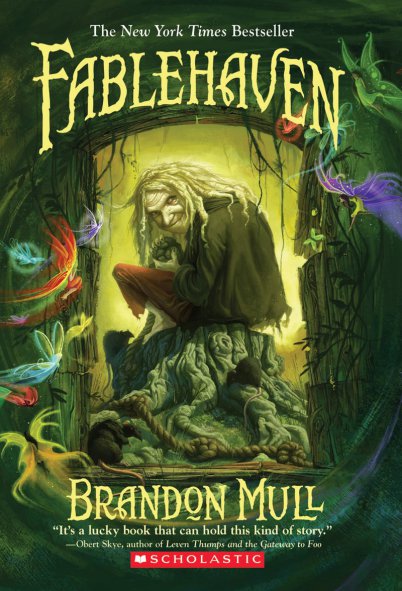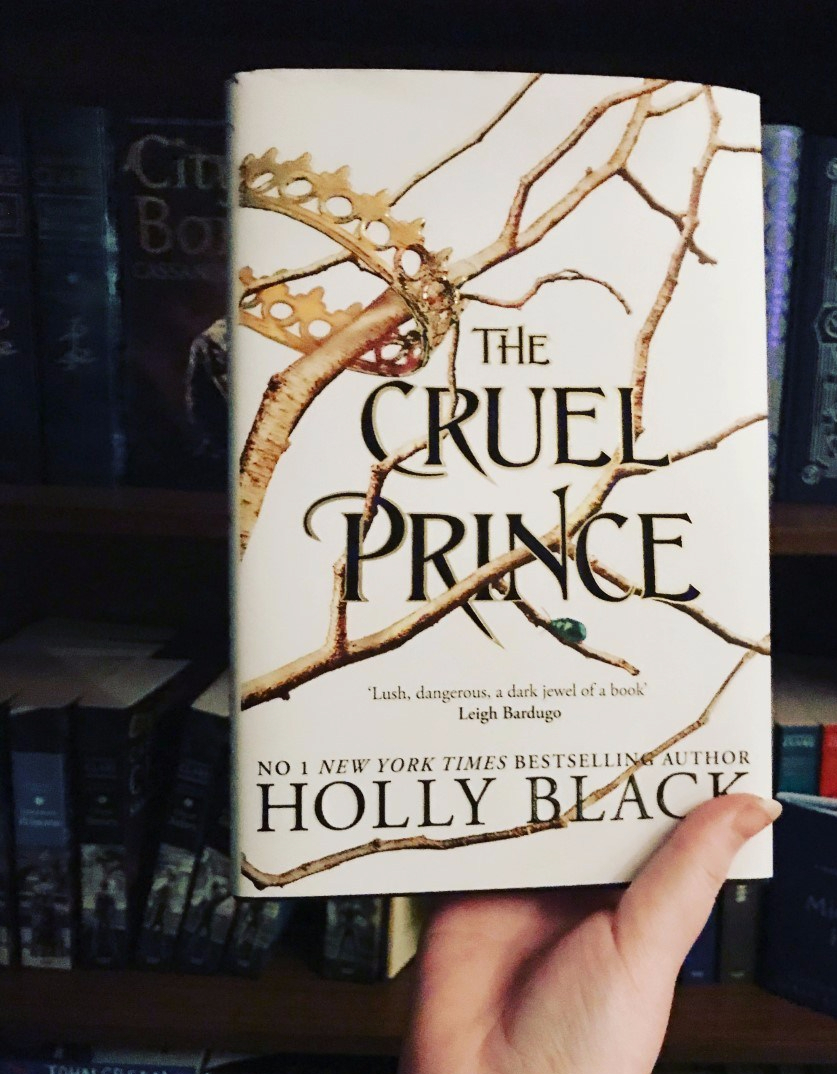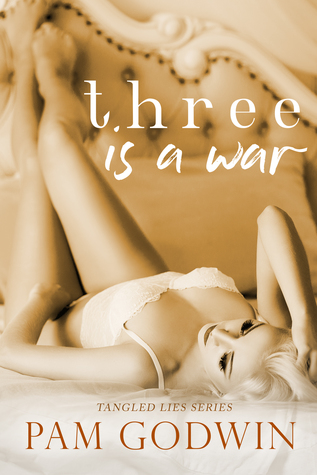 This is going to date me, but I remember when Fablehaven, by Brandon Mull, was first published. I was a young, bright-eyed student in my second year of college (my first time through college) when I started noticing people (usually women) walking around with these books under their arms. They had bright, cheery colors, and looked far too young for the people who were carrying them. It took me a while, but I eventually broke down and bought the first book (this was after Deathly Hallows was released, which I read in a 24-hour period and then wondered what I would do with the rest of my life).
This is going to date me, but I remember when Fablehaven, by Brandon Mull, was first published. I was a young, bright-eyed student in my second year of college (my first time through college) when I started noticing people (usually women) walking around with these books under their arms. They had bright, cheery colors, and looked far too young for the people who were carrying them. It took me a while, but I eventually broke down and bought the first book (this was after Deathly Hallows was released, which I read in a 24-hour period and then wondered what I would do with the rest of my life).
The series was interesting–it was no Harry Potter, but it helped to fill a hole left in its absence.
Recently, I’ve been thinking about reading the Fablehaven series again, especially with the semi-recent release of a new book: Dragonwatch. What better way to commemorate that then by doing a Rereadable post?
Reading through this book for the first time in years (at least five), I was struck by one fact: there are so many words!
By now you’re probably thinking, “Um, Ellie, books are made of words.” But that’s not what I mean. I’m not stuck in Twitterverse where each bit of information takes up (now) 280 characters. When I say, “so many words,” I mean there are so many words that slows things down, makes it clunky, and clutters up minds that can otherwise fill in the blank.
Here are some examples:
Kendra sat her towel and the mirror on the table and grabbed a bottle of sunblock. She smeared the white cream over her face, arms, and legs until it disappeared into her skin. (Could have been reduced to, “Kendra sat her towel and the mirror on the table and grabbed a bottle of sunblock. She smothered her body in the white stuff,” if this description was really necessary)
He had avoided Kendra all morning. He did not feel like talking to anybody. He could not get over how foul the fairy had become. He was not sure what he had done, but he knew it was somehow his fault, some accidental consequence of catching the fairy. That was why she had been so frightened the night before. She knew he had doomed her to change into an ugly little monster. (Shows how Mull avoids contractions at all costs, uses passive voice, and too many words. Could be reduced to, “He didn’t feel like talking to Kendra, or anyone, and had avoided them all morning. He couldn’t get over how foul the fairy had become. He wasn’t sure what he’d done, but somehow it was his fault, some consequence of catching the fairy. No wonder she was so frightened the night before. She knew he’d doomed her to change into an ugly little monster.” Not many words reduced, but some)
“When I urged you to take me to Muriel, I assumed she still had two knots remaining. Only when I looked up and observed the single knot did I begin to fathom the actual predicament. By then it was too late.” (Not only wordy, but illustrates the problem Mull has with writing dialogue. This is supposed to be modern-day. Some fantasy authors make older characters in medieval-style worlds speak in flowery terms or using phrases that make them seem wiser. But in real life people don’t use thesauruses. They may be smart and use big words, but they don’t use every word in a single sentence. Especially in casual or informative conversation. And the kids spoke like this too, to an extent. Everyone was a walking thesaurus)
These may not seem like big deals, but imagine extraneous words on every single page of a 350-page book. It got aggravating at times, especially when the words didn’t seem to have any special flavor to them. They didn’t inform the reader of the POV character’s personality, and when they gave details there were so many details that absolutely nothing was left to the reader’s imagination. One paragraph I decided to leave out described, in short, choppy sentences, every single detail of a fairy-turned-imp, down to its flat, slitted nose, protruding ribs, and potbelly. But in more words.
Another thing I noticed was how the characters were all blah. Seth’s more interesting than Kendra, but only because he disobeys rules and goes off exploring. Kendra is the worst kind of Mary Sue–the absolutely boring kind. She doesn’t go exploring, she sits around solving mildly interesting clues, and she says, “don’t do the thing,” at every opportunity. Yet when push comes to shove, who ends up controlling a fairy army? Kendra does. This continues each book. Who gets special powers by hardly any risk of her own? Kendra. Who is so goody-two-shoes that she volunteers at a daycare because of course she does? Kendra. Who takes Seth’s one moment of glory from him at the end of the last book, not because anything happens that would stop him, but because she takes a sword from him right before he succeeds? Kendra does. She never fails, because she never tries something she might fail at. People say Kendra is a good role model. I say she is too flat to be any sort of role model. She doesn’t deal with hard things. Seth deals with hard things, but not Kendra.
Reading this book actually made me think of another series I read when I was at the age this series was targeted towards: Animorphs by K.A. Applegate. I was at least in the fifth grade, maybe the fourth, when I started reading them. These books had characters with depth (at least, as far as I can remember) and character growth. These books dealt with hard issues like child abuse, family member loss, even things like the morality of stealing DNA from dolphins because they’re intelligent. I mean, I sure wouldn’t have thought about any of these things if they weren’t in these books. In Fablehaven? “Breaking rules can get you killed. So don’t break rules. Except that I am happy that you broke the rules. Good job breaking the rules. Hey, don’t break that rule!” Have we really dumbed down as a species in just over ten years, that authors believe children can’t handle tough moral concepts? I don’t think so, because, like I mentioned earlier, Harry Potter ended about a month after the second Fablehaven book was released.
So what is good about this book? It is entertaining. And it does give interesting twists on fantastical creatures living on a magical preserve. There are hints at a secret society trying to bring down the structure of the preserves, to set all magical creatures free across the land. Enough so that when the second book (which does, if I remember right, up the ante quite a bit and bring in elements that are unique to the Fablehaven series) landed in my fingertips, I read it in a short amount of time. As well as the third. And the fourth. And the fifth.
Now, Brandon Mull has written three other series (The Candy Shop Wars, The Beyonders, and The Five Kingdoms), been a co-author on a fourth (Spirit Animals), and is starting a continuation of Fablehaven with Dragonwatch. And, rumor has it that Fablehaven will be made into a movie (though that has been in preproduction for the past five years with no evidence of going forward). I remember being satisfied, though not ecstatic, with the other Fablehaven books, and when I listened to The Beyonders‘ first book I was entertained. Perhaps Fablehaven‘s weaknesses are the result of first-novel syndrome. I’ll have to reread the other Fablehaven books to be sure. I wish Brandon Mull further luck with his writing career. (I also hope that, if Fablehaven does make it into moviedom, that someone else writes the dialogue. Honestly!)
Advertisements Share this:




